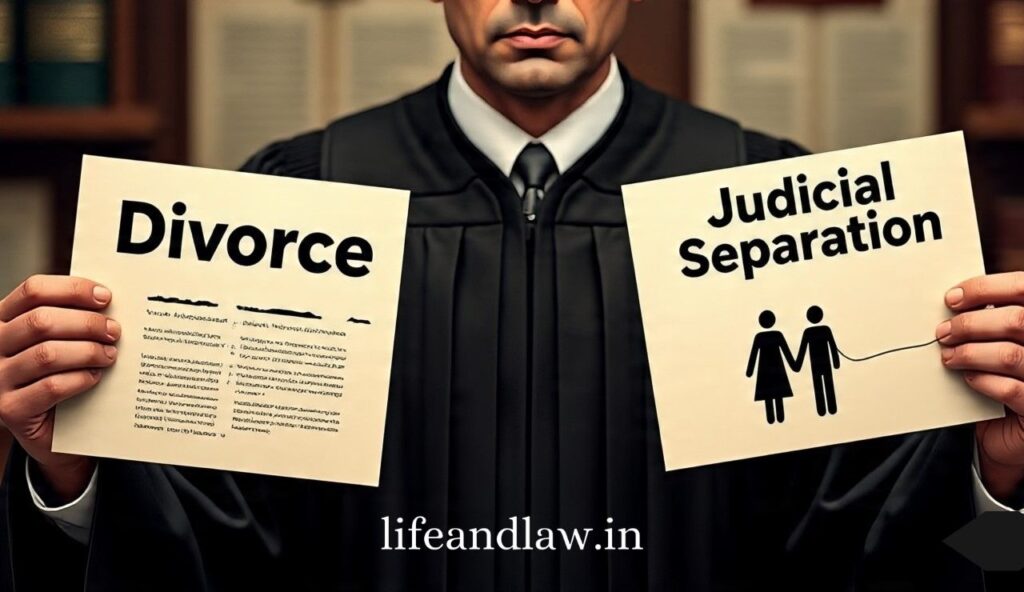Trending

Marriage is both an emotional and legal commitment between two people.However, when marital life faces major obstacles, couples may be forced to consider living separately.In such cases, the law offers two main legal options: divorce and judicial separation.While both serve the aim of separation, they differ greatly in terms of legal consequences, emotional impact, and future prospects.
This article tries to clearly clarify the underlying legal differences between divorce and judicial separation, outline their respective processes, and assist individuals in determining which option may be more suited based on their specific circumstances.Gaining this knowledge is critical for making an informed decision on whether to keep the marriage or end it legally.
Legal Definition:
According to Section 10 of the Hindu Marriage Act of 1955, judicial separation permits a husband and wife to live apart without terminating their marriage.The marital connection is still legally valid, thus neither party can remarry.Reconciliation eliminates the need for a new marriage.The court may also rule on child custody and support.
What Happens After Judicial Separation?
The pair lives apart but is nonetheless legally married.They are unable to claim marital rights or remarry.The court can decide on custody and support, and in some situations, one partner may later seek divorce.
Legal Definition:
Divorce, as defined in Section 13 of the Hindu Marriage Act of 1955, is the irreversible legal dissolution of a marriage. Once approved, both spouses are free to remarry, as the marriage no longer has legal standing.
What Happens After Divorce?
The marriage link is permanently dissolved.Both parties are free to remarry, and the court has the authority to issue alimony or maintenance and make decisions about child custody.
Judicial Separation: Legally separated, although the marriage is still valid.
Divorce: Marriage is forever dissolved.
Judicial Separation: Neither party may remarry.
Divorce: Both parties can freely remarry.
Judicial Separation: Simpler and less expensive.
Divorce: More time-consuming and complicated.
Judicial Separation: Certain obligations, including alimony or child support, may continue.
Divorce: Most financial relationships cease until alimony is ordered.
Judicial Separation: Allows for self-analysing and possible reconciliation.
Divorce: Final decision, with long-term emotional and societal consequences.
Judicial Separation: Both maintain parental rights; custody agreements may be established.
Divorce: The court determines custody.
Judicial Separation: Usually there is no property division.
Divorce: The court decides property division.
Judicial Separation: Marriage is perceived as intact and judicial separation results in less disturbance.
Divorce: Increased social and familial influence.
Judicial Separation: Reconciliation is possible without remarriage.
Divorce: Final—requires a new marriage to reconcile.
When deciding between divorce and judicial separation, consult with a family law practitioner to fully grasp the legal process, rights, and its consequences.It is advised that you consult Adv. Abdul Mulla, the author of this article, using platforms such as www.knowdivorce.com, www.asmlegalservices.in, or www.lifeandlaw.in.
Divorce and judicial separation are both legal solutions to marital problems, but they have different outcomes.Personal, emotional, and practical considerations all play a role in making the best choice.
Who Should Opt for Divorce?
Divorce is appropriate when both couples are ready to terminate the marriage permanently, particularly if there is a desire to remarry or the partnership has become emotionally or financially toxic.It is the ultimate step, requiring serious consideration of its legal, emotional, and sociological implications, as well as clarification on issues such as property, custody, and financial responsibility.
Who Should Opt for Judicial Separation?
Judicial separation is ideal for people who refuse to divorce for emotional, religious, or social grounds.It’s also appropriate if the couple is financially interdependent or willing to reconcile in the future, or if keeping the marriage legally benefits the children.
Divorce and judicial separation are both essential legal alternatives in marriage, but they vary fundamentally.Divorce terminates the marriage, whereas judicial separation permits the couple to live apart while staying legally married.The decision on which option to take is dependent on each individual’s circumstances.When making an informed decision, it is critical to take into account social, economic, and psychological variables.
Understanding the legal implications of divorce or judicial separation is critical, because the decisions made might have long-term consequences.Seeking competent guidance from a family law practitioner is vital for understanding rights, obligations, and processes. Adv. Abdul Mulla, the author of this article, can be contacted at www.knowdivorce.com, www.asmlegalservices.in, or www.lifeandlaw.in.
Adv. Abdul Mulla (Mob. No. 937 007 2022) is a seasoned legal professional with over 18 years of experience in advocacy, specializing in diverse areas of law, including Real Estate and Property Law, Matrimonial and Divorce Matters, Litigation and Dispute Resolution, and Will and Succession Planning. read more….
Copyright BlazeThemes. 2025